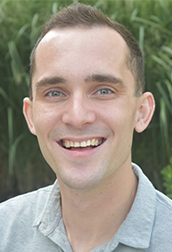Late on the first Sunday night of February, our city erupted with joy after the Chiefs won the Super Bowl, and people filled the streets with celebration. My boyfriend and I had spent the evening at some friends’ on the other side of Midtown; driving home down 39th street from State Line to Troost felt like driving through the middle of an impromptu parade with people flooding out of bars and homes dancing and cheering. None of us knew that COVID was right around the corner or that it would not be the only time that people took to the streets here in Kansas City (as in cities across the world). However, one person had a hunch that things might be too good to be true on that February evening.
Mayor Quinton Lucas became our Mayor just weeks before the Super Bowl and joked about this premonition while speaking at an event in September with our Roots young adult ministry. The event was a simple but special chance to spend an hour with the Mayor in our church backyard, masked-up and socially-distant, to hear him share stories and take questions about his first year as Mayor of Kansas City. It makes sense that he felt like a Super Bowl victory so quickly after being elected felt a bit too good to be true, but in reality Mayor Lucas had no idea of the challenges and curve-balls to come this year. We were all eager to hear about what’s guided him in his leadership, particularly as it related to the pandemic and in response to the historic protests and heightened awareness around systemic injustice and racism in our country. One thing that Mayor Lucas talked about has lingered in my mind since September: the important task of naming mistakes and openly addressing areas of improvement. He said that leaders like him should not feel that they have to tip-toe around conversations concerning flaws or failures, but instead should dive eagerly into honest conversations about what is needed for growth and change. Society is an unfinished project; the need for growth is part and parcel of being human. But sometimes, it’s treated as anathema to thoroughly pay attention to places where improvement is needed. Perhaps it is just more straightforward to pay attention to places where improvement is easy than it is to truly attend to change where it is more difficult and demanding (and probably all the more important).
On Saturday, our country’s president-elect said that it is a “time to heal in America.” Indeed, there is much from which we need healing: the present pandemic, our past that’s riddled with racist injustice and violence, and the things keeping us from a future that’s overcome our present division. However, as a tweet I came across this week pointed out, in order to truly heal, we need a proper diagnosis. Along with the author of this tweet (which for the life of me I cannot now find), I am not so sure that we have fully diagnosed the reasons for our division and dysfunction as a country. It’s imperative that we— from our elected leaders to those of us in the middle of day-to-day civic life— remember the duty we have to dive into difficult conversations of diagnosis. True healing requires us to do what Mayor Lucas mentioned at the Roots event in September: to refuse to tip-toe around conversations and to confront issues face-on until we know exactly what it is with which we are dealing.
I’m reminded of Jesus’ bold declaration in Mark 2: “Those who are well have no need of a physician, but those who are sick; I have come to call not the righteous but sinners.” As Jesus’ followers, we need not pretend we are healthy where we are not but instead can trust that in Christ, we have a model for healing that truly is “good news to the whole creation” (Mark 16:15). One of my favorite songs that we sang at the church I grew up in was a jubilant song that borrowed language from the prophets of the Hebrew Bible and the book of Revelation. It sang of a day in which the whole of creation finally is filled with the sound of good news. The chorus below captures an image of the future God wants, the same future we read about the prophets and in the New Testament.
Open up the doors and let the music play
Let the streets resound with singing
Songs that bring Your hope
Songs that bring Your joy
Dancers who dance upon injustice
As we look back at the things we’ve been through as a community, as a city, and as a country in recent months, we realize that much healing and change are necessary until we can truly fill the streets with singing of God’s hope and dancing upon injustice. Indeed, to be human is to be unfinished. We are always growing and changing like the ever-evolving creation in which we live, and each day we are invited into newer and fuller expressions of the life God breathes in and through us. Do we have the dedication to dive into conversation about that to which we’re called? Will we explore deeply the ways we can partner with God to make wholeness in our fragmented world? Though at times the obstacles will seem insurmountable, we can trust that God will complete what God has begun, and that one day indeed the doors will be open and streets will resound with singing.




